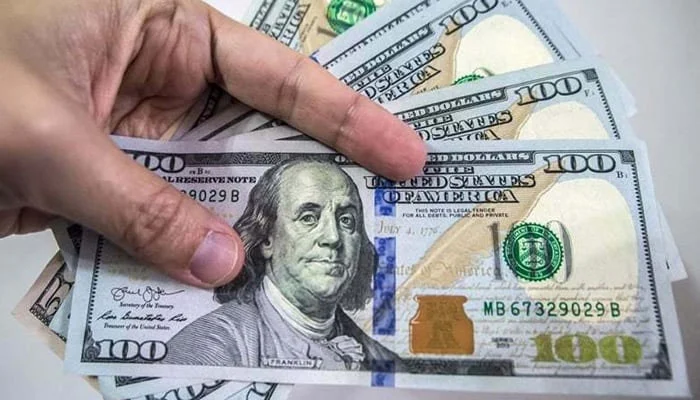Millions of dollars are being smuggled into Afghanistan from Pakistan every day, providing some support for the squeezed economy after the US and Europe denied the Taliban regime access to billions in foreign reserves. For Islamabad, the outflows are exacerbating a rapidly developing economic crisis, foreign media reported.
Traders and smugglers are bringing as much as $5 million across the border daily, according to Muhammad Zafar Paracha, general secretary of the Exchange Companies Association of Pakistan, a 26-member body of currency dealers. That more than covers the as much as $17 million that Afghanistan’s central bank injects into the market each week. The illicit flows show how the Taliban are evading sanctions after their 2021 takeover of the country. For Pakistan, it’s contributing to the depletion of foreign reserves and adding to the downward pressure on the rupee as the currency tumbles to record lows and the economy teeters on the edge of collapse. “Currency is being smuggled without any doubt,” Paracha said by phone. “This has become quite a lucrative business.”
When the Taliban retook Kabul after two decades in August 2021, the US and Europe blocked more than $9 billion in Afghan central bank reserves, fearing the funds would be used by the militant group for terrorism. On pressure from the United Nations, the US agreed to release half of it to help the economy, but put this on hold after the Taliban prohibited Afghan women from attending school or working.
Seventeen months later, Afghanistan remains in a dire condition and the human-rights situation is only worsening. The UN has warned that more than half the population faces acute hunger over the harsh winter. But money from its neighbour is helping the regime to scrape by. “Afghanistan has about a $10 to $15 million requirement on a daily basis,” said Khurram Schehzad, chief executive officer at Alpha Beta Core Solutions Pvt Ltd., a financial consultancy in Pakistan’s commercial capital, Karachi. Half of this is estimated to come from Pakistan, he said.
Da Afghanistan Bank, the Taliban-run central bank, has enough dollars in reserve to support the economy, said spokesman Haseeb Noori. Some of it comes from the UN, which has been providing about $40 million in humanitarian aid each week since last year. As Afghanistan is cut off from the global banking system, the money is transported in cash into Kabul, and needs to be converted into afghani, the local currency, after it arrives. So even though the aid doesn’t directly benefit the Taliban, the dollars ultimately end up in the central bank’s coffers. The UN wasn’t immediately available to comment. Customs tariffs, some of which are collected in dollars, are another source of funds for the regime. “The UN actually supports the afghani currency by supplying dollars to the markets and buying afghanis in exchange,” said Torek Farhadi, a former International Monetary Fund adviser in Washington. “Demand for afghani is actually created by the UN and other sources including dollar smugglers.”
The afghani has gained about 5.6% against the greenback over the past year through Monday, one of the strongest performances of any currency in the world. The Afghan currency has recovered to about 89.96 per dollar after hitting an all-time low of 124.18 in December 2021, a few months after the Taliban returned to power.
Pakistan’s rupee has lost about 37% against the US currency over the period, one of the largest declines. It fell about 10% in one day in late January, the biggest drop in at least two decades, as the crisis-stricken government relaxed its grip over the exchange rate in a bid to win much-needed loans from the IMF. Pakistan has been struggling with the aftermath of deadly floods, raging inflation, political turmoil and foreign reserves that fell to $3.09 billion in the week ended Jan. 27, the lowest in nine years.
The smuggling really took off in the middle of last year after Afghanistan increased coal exports to energy-hungry Pakistan, according to officials at Afghanistan’s finance ministry. It has also been boosted by the Taliban’s ban on the use of Pakistan’s rupee as legal tender in Afghanistan, which forces exporters to trade in dollars and bring the US currency back to the country, the officials said, asking not to be identified because they aren’t authorized to speak to media. “Our market is bound to get affected when they purchase dollars from the local market,” Jameel Ahmad, governor of Pakistan’s central bank, said in a brief interview before a press conference on the country’s interest-rate decision on Jan. 23.
Haji Mohammad Rasool is one such trader, exporting coal to Pakistan. Coal is Afghanistan’s primary export and Pakistan is its biggest trading partner. He buys coal in afghani, sells it in rupee for a markup, converts the rupee into dollars and sends them back to Afghanistan via the traditional Hawala system for transferring funds. Finding dollars is difficult in cash-strapped Pakistan, Rasool says, so he uses gray markets near the border in places like Peshawar, where he’s willing to pay as much as 10% more than the official rate.
“Almost all traders do the same,” he said of bringing dollars into Afghanistan. We’re “prohibited by the Taliban from bringing rupees back into the country.” The Taliban encourage everyone to bring in any amount of cash in dollars, but have cut the maximum dollar transfer allowed out of the country by half to $5,000, said Ahmad Wali Haqmal, a spokesman for the finance ministry.
For Paracha of the Pakistan currency dealers’ group, the problem lies with Pakistan’s “flawed” immigration and trade policies and border controls. Thousands of people are crossing the border every day without visas, he said. And many of them are carrying dollars.

